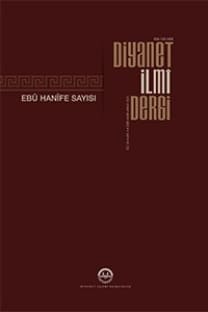EȘ’ARÎ VE EBU’L-MUÎN EN-NESEFÎ’DE KESB TEORİSİ
İnsanın eylemindeki rolü, davranışların sahibinin kim olduğu ve olup bitenlerin kim tarafından tayin ve takdir edildiği sorusu, İslam düşünce tarihinin ilk tartışmalarına konu olmuştur. Bir yandan cahiliyeden kalma her şeyin “dehr” tarafından belirlenmiş olduğu şeklindeki fatalizmden doğan Cebriye, diğer yandan kökenlerini felsefe tarihinde bulabileceğimiz ve insan sorumluluğunu esas alan özgürlükçü kader anlayışı. Bunlardan birincisini ulûhiyet merkezli, ikincisini insan merkezli olarak kabul edebiliriz. Bu makale, bunların arasında bir yerde olan “kesb” ile ilgilenmektedir. Eş’arî ve Nesefî, bu makalenin ana mihverini oluşturmaktadır. Çünkü ilki, kavramı sistematik bir biçimde kader paradigmasının merkezine yerleştirmiştir. İkincisi de, kesbi oluşturan alt kavramların tahlilini Mutezile diyalektiği çerçevesinde uzunca bir biçimde ortaya koymuştur. Ekol olarak farklı çizgilere ait bu iki düşünürün, dönemin şartları dikkate alındığında benzer görüşleri savundukları anlaşılmaktadır. Kaynakları incelediğimizde, iki ismin de ulûhiyeti esas aldığını ancak Nesefî’nin insan sorumluluğuna ve özgürlüğüne daha fazla yer verdiğini görmekteyiz. Bununla birlikte kader tartışmaları, bağlamından ve tarihinden koparılarak okunduğunda, ilgili düşünürlerin anlayışları yanlış yorumlanabilir.
THE THEORY OF KASB ACCORDING TO AL-ASH’ARI AND AL-NASAFI
The questions of the role of human on his/her actions, and who is the owner of behaviors, and who is the determiner of the happenings have been the subject of the first debates of the history of Islamic thought. On one side we have Jabriyah, which was stemmed from the fatalism of Jahiliyyah that believed everything was determined by the time (dahr) on the other side liberal concept of fate based on the human responsibility which we can find its root in history of philosophy. We can accept the first one as the divinity-centered and the latter human-centered. This article deals with the “kasb” which stands between them. Al-Ash’ari and al-Nasafi consist of the axis of this article. The first one, placed the concept in a systematic manner to the center of fate paradigm. The latter revealed the analysis of the sub-concept of what constitutes kasb in detail in the framework of Mutazilah dialectics. It is understood that these two thinkers of different schools defended similar thoughts at that time. When we investigate the sources, though alNasafi gave more space to human will and liberty, we see that both thinkers grounded their thoughts on the divinity-centered understanding. However, when the debates regarding fate are handled apart from the context and history the thoughts of thinkers could be misunderstood.
